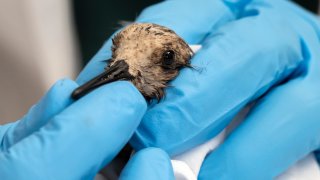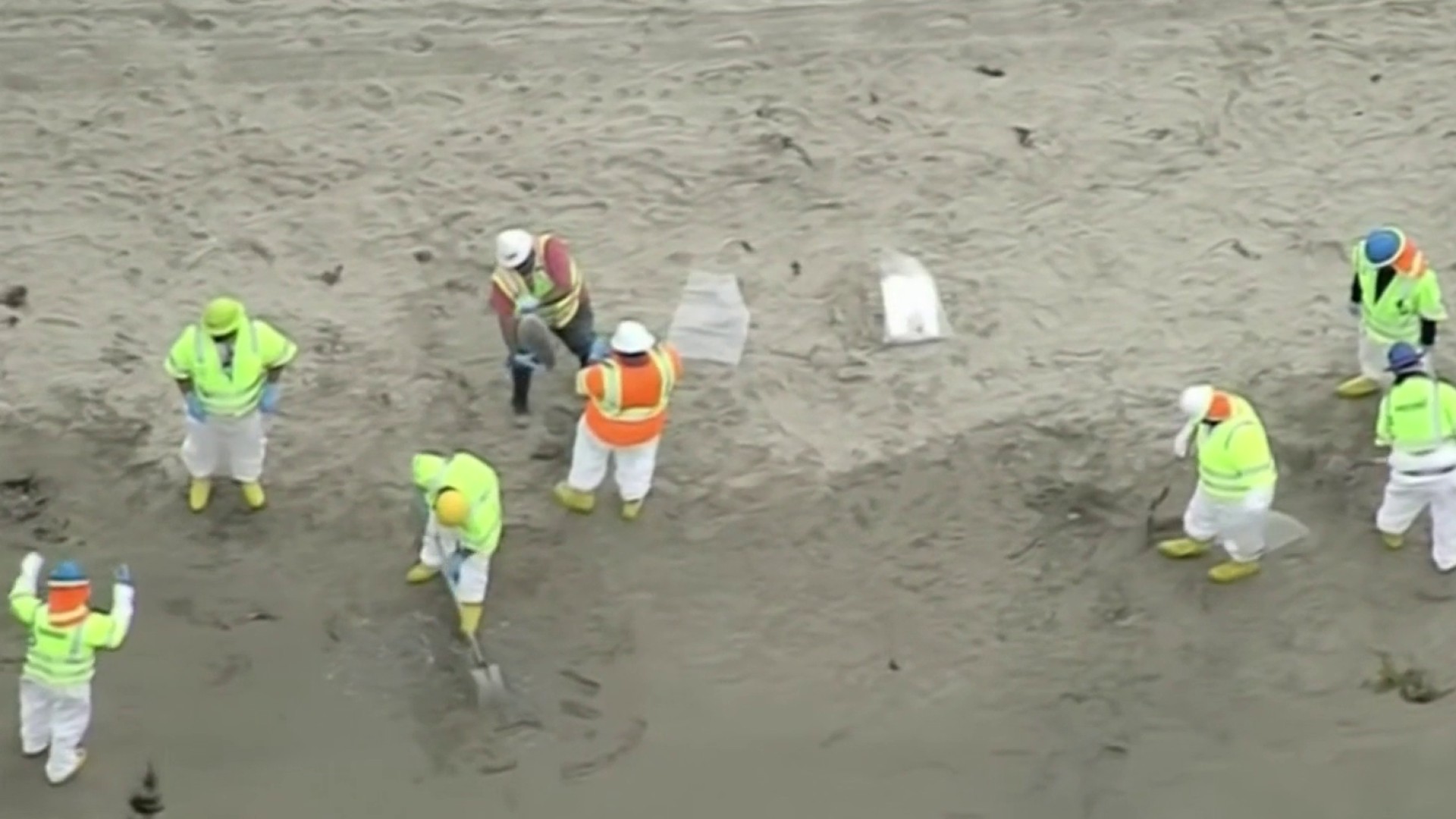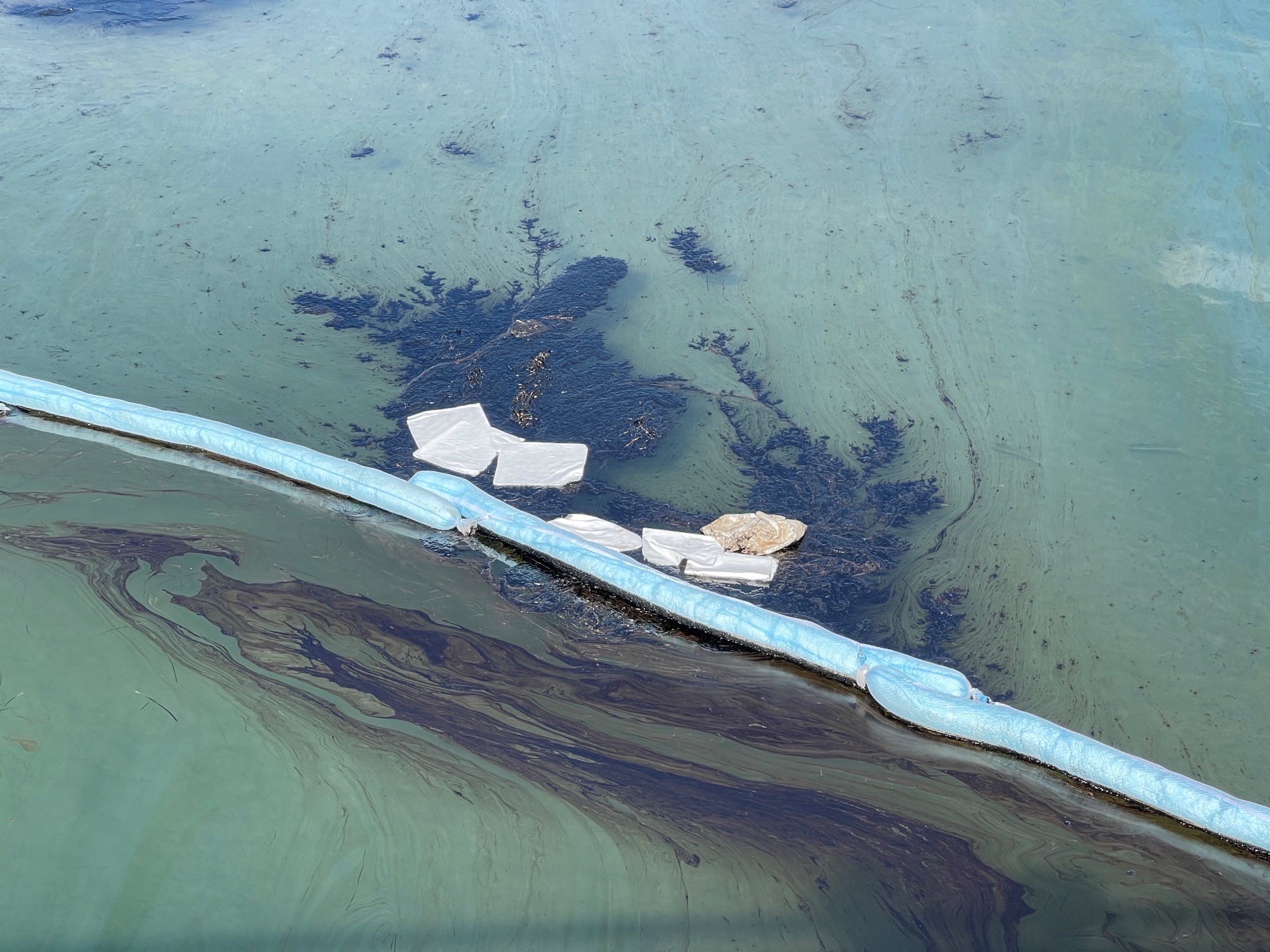
Huntington Beach, CA – October 04: Veterinarian Duane Tom examines a sanderling, a small shore bird brought to the Huntington Beach Wetlands and Wildlife Care Center on Monday, October 4, 2021 due to the oil spill. (Photo by Mindy Schauer/MediaNews Group/Orange County Register via Getty Images)
More than 80 birds and fish affected by oil from a pipeline leak off the shores of have been recovered, with more than half dying, officials said Tuesday.
A total 73 birds were recovered, with 45 dying, according to the Oiled Wildlife Care Network. Nine dead fish have also been recovered.
Meanwhile, environmental activists pressured Orange County Rep. Michelle Steel to join efforts to ban offshore oil drilling, but the Republican congresswoman said she has introduced legislation to crack down on the traffic jam of cargo ships along the coast.
Get top local stories in Southern California delivered to you every morning. Sign up for NBC LA's News Headlines newsletter.
The Stopping Hazardous Incidents in the Pacific Act, or SHIP Act, would prohibit cargo ships from idling or anchoring within 24 nautical miles of the Southern California coast. Steel said she introduced the legislation after learning that investigators suspect an anchor from a ship may have caused the Oct. 2 Orange County leak. The ban would last for six months or until President Joe Biden declares that a backlog in the ports was over.
"Cargo ships idling for months off the Orange County coastline have become an environmental and public health crisis,'' Steel said in a statement. "It's time to get the ports working again and get these ships moving and out of our waters. This crisis could have been prevented and it's important that we protect our waters and coastline.''
About two dozen activists went to Steel's office in Huntington Beach Tuesday to appeal to her to support legislation in the Build Back Better bill sponsored by Rep. Mike Levin, D-Dana Point, that would stop future offshore drilling in federal waters. There is already a ban on state waters.
Steel has not responded to a request since last week asking for her position on the proposed legislation.
Aaron McCall, a federal advocacy coordinator for California Environmental Voters, said Steel's proposed legislation was "not only deeply irresponsible, it's the policy proposal that's basically the equivalent of saying people's faces should stay out of the way of someone's fist.''
McCall said it was a "deflection,'' and added, "There's one solution and that's to stop offshore drilling.''
Clamping down on cargo traffic would "put the economy at risk'' and that the bill was to "deflect the blame and protect oil polluters.''
Removing cargo ships won't solve the problem because, "There's going to be other sorts of risks that will lead to these ruptures,'' McCall said.
The Democratic congressional delegation that includes Reps. Lou Correa, D-Santa Ana, Katie Porter, D-Irvine, and Alan Lowenthal, D-Long Beach, support efforts to curtail offshore drilling. Rep. Young Kim, R-Placentia, has not responded to messages on the issue.
As the cleanup continued Tuesday, so did the work of investigators who are researching what caused the leak and who should be held accountable for it and in what way.
Attorney General Rob Bonta and Sen. Alex Padilla, D-California, toured the site and received a briefing from Coast Guard officials Monday before Bonta announced his office is investigating the leak to determine if any civil or criminal action is warranted.
Meanwhile, Assembly Speaker Anthony Rendon, D-Lakewood, announced a select committee on the oil spill will be led by Assemblywoman Cottie Petrie-Norris, D-Laguna Beach.
"We're doing an investigation,'' Bonta said. "We are determining whether civil or criminal enforcement action is appropriate. ... We are prepared to do what is necessary to get a full accounting of what happened.''
Although the leak occurred in federal waters, Bonta said his office had the authority to conduct civil or criminal probes.
"We represent multiple agencies and departments that have an interest such as parks and recreation, fish and wildlife, the coastal commission, state lands,'' Bonta said.
He noted Orange County District Attorney Todd Spitzer was also doing an investigation and that his office was collaborating with those prosecutors.
But, Bonta added, "We can't get to the liability and burden of proof until we know what the facts are.''
Padilla said state law prohibits offshore drilling in state waters, "So where we need to close the loophole is in federal waters. ... Many people, including myself, have been calling for a ban on offshore drilling in federal waters for some time now.''
Rendon echoed that point at a separate news conference Monday, saying the oceanfront is not only "gorgeous,'' but, "Our ocean is also a life giver.''
"Now we need to guarantee it will remain safe and clean,'' he said.
"It's not only an environmental question, but an economic question. How do you have a Surf City USA that people can't go surfing at?''
Petrie-Norris said the committee was an "important step to assure that we get to the bottom of this tragedy and to assure we have oversight and accountability on the state level.''
She said there were many "unanswered questions'' about the response to the leak by Amplify Energy, the company that owns the oil rig and pipeline involved.
City and state beaches in Huntington Beach reopened Monday morning.
The move came after water-quality testing results showed non-detectable amounts of oil-associated toxins in ocean water, Huntington Beach police spokeswoman Jennifer Carey said.
Officials continued to warn the public not to handle any tar balls they may encounter on the sand. Oil contains hazardous chemicals, and beachgoers who encounter tar balls were encouraged to email tarballreports@wildlife.ca.gov. If skin contact occurs, they are advised to wash the area with soap and water or baby oil and avoid using solvents, gasoline, kerosene, diesel fuel, or similar products on the skin. Officials say these products, when applied to skin, present a greater health hazard than the tar ball itself.
The Unified Command responding to the leak that was first reported Oct. 2 is headed by the U.S. Coast Guard and also includes officials from Orange County, San Diego County, the California Department of Fish and Wildlife and Amplify Energy Corp.
Contracted cleanup teams were cleaning locations from Seal Beach to San Onofre Beach, while officials were conducting water and soil sampling Sunday along San Onofre Beach.
The leak was reported on the morning of Oct. 2 a few miles off the Huntington Beach coast, although some boaters reported smelling something in the water on Oct. 1.
Authorities initially estimated that as much as 144,000 gallons of oil may have leaked from the damaged pipeline, but officials said Thursday the actual amount is likely much lower, although there is still no firm number. At a news conference Thursday afternoon, USCG Capt. Rebecca Ore estimated that roughly 588 barrels of oil had spilled, which would equate to about 24,700 gallons. That's being considered a minimum amount leaked, with officials estimating a maximum potential of around 130,000 gallons.
Amplify CEO Martyn Willsher insisted the company was unaware of any release of oil into the ocean until about 8 a.m. Oct. 2, adding that the firm responded and reported the incident immediately.
The U.S. Department of Transportation's Pipeline and Hazardous Materials Safety Administration's Office of Pipeline Safety issued a corrective action order last week, saying workers in the company's control room "received a low-pressure alarm on the San Pedro Bay Pipeline, indicating a possible failure at about 2:30 a.m. Saturday (Oct. 2),'' but the pipeline carrying crude oil was not shut down until about 6 a.m.
Asked repeatedly about that timeline during a media briefing in Huntington Beach, Willsher only said the company was cooperating fully with federal and local investigators.
Meanwhile, the Coast Guard's lead investigator said Friday the ruptured underwater pipeline might have been damaged several months to a year ago, adding that it's unclear when the 13-inch crack in the line occurred or when oil began seeping into the water.
Capt. Jason Neubauer said underwater video of the damaged 17.7-mile pipeline shows "marine growth'' around the crack in the pipeline that was left exposed when its concrete casing was ripped away, likely by the strike of a ship's anchor that hooked the line and dragged it 105 feet out of place.
Investigators were analyzing the maturity of the vegetation to give them a clue as to when the pipeline was initially struck and lost its protective concrete casing. Also unclear is exactly when the crack in the pipeline occurred. Neubauer said the pipe may not have ruptured when a roughly 4,000 foot section of it was originally pulled out of place and stripped of its concrete casing. Or a small crack may have occurred that gradually got bigger over time, leading to the 13-inch fissure now present in the pipe.
The spill occurred in federal waters at the Elly oil-rig platform, built to process crude oil from two other platforms, which draw from a large reservoir called Beta Field. Elly is one of three platforms operated by Beta. Operating Co., which is owned by Amplify Energy and also operates Ellen and Eureka nearby. Elly processes oil production from Ellen and Eureka and is fed by some 70 oil wells. The processing platform separates oil from water.
Elly is one of 23 oil and gas platforms installed in federal waters off the Southern California coast, according to the Interior Department's Bureau of Ocean Energy Management. Besides Elly, a processing facility, there are 20 others that produce oil and gas, and two are being decommissioned.




